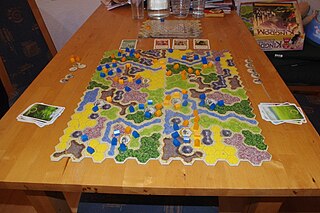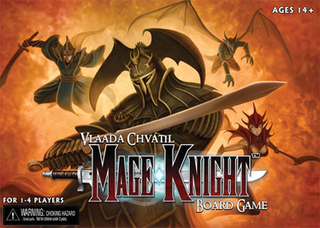Related Research Articles

Torres is a German-style board game designed by Wolfgang Kramer and Michael Kiesling and published in 1999 by FX Schmid in German and by Rio Grande Games in English. The game strongly influenced Kramer and Kiesling's Mask Trilogy of games, but is not considered to be a part of the trilogy. The game has since been reprinted.
Risk 2210 A.D. is a 2–5 player board game by Avalon Hill that is a futuristic variant of the classic board game Risk. Risk 2210 A.D. was designed by Rob Daviau and Craig Van Ness and first released in 2001. In 2002, it won the Origins Award for "Best Science Fiction or Fantasy Board Game of 2001".

Alhambra is a 2003 tile-based German-style board game designed by Dirk Henn. It was originally published in Germany by Queen Games in a language-interdependent version; an English-specific version was released in North America by the now-defunct Überplay. The game is an Arabian-themed update, set during the construction of the Alhambra palace in 14th century Granada, of the 1998 stock trading board game Stimmt So!, which in turn was an update of the 1992 mafia influence board game Al Capone; the original version was subsequently released as Alhambra: The Card Game. Upon its release, Alhambra won numerous awards, including the Spiel des Jahres award. Its success has led to the release of numerous expansion packs and spin-off games, and is becoming Queen Games' flagship franchise.
Löwenherz is a German-style board game designed by Klaus Teuber and published in 1997 by Goldsieber in German and by Rio Grande Games in English. A revised edition, titled Löwenherz: Der König kehrt zurück in German and Domaine in English, was released in 2003 by Kosmos in German and Mayfair Games in English.

Amun-Re is a game designed by Reiner Knizia and first published in 2003 by Hans im Glück in German and in English by Rio Grande Games.

The Princes of Florence is a German board game designed by Wolfgang Kramer and Richard Ulrich published in 2000 by Alea in German and by Rio Grande Games in English. Players assume the roles of Florentine Princes who wish to design their own villas to allow artists to create great works of prestige. Through seven rounds, each containing an auction phase and two action phases, the Princes pay for landscaping, buildings, freedoms, and various services and bonuses. At the end of the seven rounds, whoever has the most Prestige Points wins.
To Court the King is a dice-based board game for 2–5 players designed by Tom Lehmann. It was published in German by Amigo Spiele as Um Krone und Kragen in 2006, and in English as To Court the King by Rio Grande Games. The basic mechanics of rolling and re-rolling dice have drawn comparisons to the game of Yahtzee.

Agricola is a Euro-style board game created by Uwe Rosenberg. It is a worker placement game with a focus on resource management. In Agricola, players are farmers who sow, plow the fields, collect wood, build stables, buy animals, expand their farms and feed their families. After 14 rounds players calculate their score based on the size and prosperity of the household.
A number of related games under the Yahtzee brand have been produced. They all commonly use dice as the primary tool for game play, but all differ generally. As Yahtzee itself has been sold since 1954, the variants released over the years are more recent in comparison, with the oldest one, Triple Yahtzee, developed in 1972, eighteen years after the introduction of the parent game.

FITS is a Tetris-like board game published by Ravensburger in 2009.

Dixit, is a French card game created by Jean-Louis Roubira, illustrated by Marie Cardouat, and published by Libellud. Using a deck of cards illustrated with dreamlike images, players select cards that match a title suggested by the designated storyteller player, and attempt to guess which card the storyteller selected. The game was introduced in 2008. Dixit won the 2010 Spiel des Jahres award.

Kingdom Builder is a strategy board game designed by Donald X. Vaccarino, published in 2011 by Queen Games with illustrations by Oliver Schlemmer in German, British and international versions.

Terra Mystica is a Euro-style board game for two to five players designed by Helge Ostertag and Jens Drögemüller. The game was first published by Feuerland Spiele in Germany in 2012, and was later published in English and French by Zman Games and Filosofia Édition in 2013. Feuerland Spiele released a second German edition of the game in 2013.

Splendor is a multiplayer card-based board game, designed by Marc André and illustrated by Pascal Quidault. It was published in 2014 by Space Cowboys, Asmodee. Players are gem merchants of the Renaissance, developing gem mines, transportation, and shops to accumulate prestige points. Splendor received positive reviews and received numerous awards, including winner of Golden Geek Best Family Board Game, and nominated for the Spiel des Jahres Game of the Year in 2014. The game also received a mobile application and an expansion released in 2017.
The Crew: The Quest for Planet Nine is a board game for 2–5 players designed by Thomas Sing and released in 2019. In The Crew, a trick-taking cooperative card game with 50 missions, players aim to win tricks based on their task cards, but can only communicate limited information on their cards. Upon its release, The Crew received critical success and won numerous awards. A sequel, The Crew: Mission Deep Sea, was released in 2021.
Caverna: The Cave Farmers is a 2013 board game designed by Uwe Rosenberg. It is a complex worker placement strategy game that shares similarities in gameplay and theme with his earlier board game, Agricola, The game's theme revolves around helping a small dwarf family to settle a cave and nearby woodlands and to develop the setting through furnishing caves as well as converting forests into meadows, fields and pastures. Caverna received positive reviews from critics, two major expansions have also been released for the game.

Mage Knight Board Game is a cooperative board game for 1 to 4 players designed by Vlaada Chvátil and released in November 2011. It is based on the related collectable miniatures game, Mage Knight. It has been rated as one of the top single player board games.

Sagrada is a dice-drafting board game published by Floodgate Games.
Viticulture is a worker placement board game published by Stonemaier Games in 2013. The game's design was crowdfunded via a campaign on Kickstarter, with the concept of players building an Italian vineyard. Upon its release, Viticulture received praise for its engagement, but its luck was critiqued. Several expansions and reprints were later released.

Lost Ruins of Arnak is a 2020 designer board game by the husband-wife duo Michal "Elwen" Štach and Michaela "Mín" Štachová. It won Game of the Year in the 2020 Board Game Quest Awards as well as the 2021 Deutscher Spiele Preis.
References
- ↑ "Mombasa - Rules" (PDF). Pegasus Games. Retrieved 2019-01-02.
- ↑ "Mombasa". Board Game Geek. Retrieved 2019-01-02.
- ↑ "Winner". Hippodice Spieleclub. Archived from the original on 2017-09-11. Retrieved 2019-01-02.
- ↑ "Preisträger" (in German). Spiel Messe. Retrieved 2019-01-02.